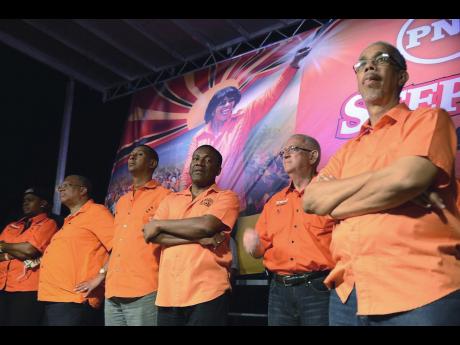A victory for democracy - Andrew beats the data as JLP catches PNP flat-footed
The victory by the Jamaica Labour Party (JLP) last Thursday made Andrew Holness the man who beat the data.
The JLP's victory defied political logic and points to how some changes in the political culture require new thinking about voting behaviour.
First, Holness is the first party leader in the history of independent Jamaica to lead his party to a general election victory despite challenges to his leadership up to a year before this poll.
This occurrence means that what is now important is how those who are going to vote view protracted leadership challenges versus the bread-and-butter issues of the economy.
Many of the voters in the estimated 48 per cent of the electorate who voted were not impacted by the macroeconomic achievements of the outgoing People's National Party (PNP) administration. So, for these voters, passing the International Monetary Fund (IMF) test was not as important as passing their standard of living test.
PARTY MANIFESTOS
The second issue that we would like to raise is the importance of party manifestos and plans.
Governments, since independence, have largely ignored their manifestos after the election, and voters know this. We, therefore, did not expect that some segments of voters would respond to the JLPs 10-point plan, particular the tax aspect.
The foregoing means, even with the lowest voter turnout to date in a general election and the expectation that the hard-core supporters would come out, some among them are malleable and message matters.
The majority of the JLP and the PNP campaign advertisement were positive ones, which articulated the message of the parties. The JLP ads had more content and this was sufficient to convince the majority of the people who voted.
The PNP assumed that with the Jamaica Urban Transit Company's expansion, the increase in minimum wage to come next month, the increase in the National Housing Trust loans to contributors, positive macroeconomic indicators and the highways, ganja reform, private sector and external support for its economic policies, and so on, it didn't need to campaign on the issues.
Social media is also very important and this is where the JLP, with its election app, carved out a strategic advantage with its targeted messages.
The JLP victory is even more significant because the party has been in power only four out of the last 26 years. This minimal time in governance in just under 30 years for us meant that it needed more attack ads pointing to weaknesses in the PNP that were salient to voters, and more contrast ads that articulated how its policies differed from the PNP's.
STAYING ON MESSAGE
Obviously, staying on message with positive ads worked for the JLP. The party's campaign songs had nicer tunes, which stayed on message and attacks like "Goodbye Portia, goodbye."
The JLP was careful not to attack a prime minister from the grass roots directly in ads like it did in 2011, but it did so effectively in song without being disrespectful.
The issue of the debates, we think, is very important and political leaders and forecasters should place more weight on the debates in future general elections.
The PNP mistakenly thought that it could win the election without debating the JLP because it was ahead and debates are new and unimportant in the political culture.
Jamaica is an oral culture and we love clashes, including verbal ones on the political stage. Debates, we now know, appeal not only to the issue voters but also some JLP and PNP hard-core voters.
In the 2007 general election, when Portia Simpson Miller did poorly against Bruce Golding in the debate, the polls picked up that fewer people were going to vote for the PNP in 2007 than those that voted for the party in 2002.
The PNP's strategy of attacking Holness about his house backfired because the party spent weeks on Holness' house while the JLP stayed on message.
Voters respond more to negative information so negative ads are usually very effective with one caveat. Negative messages will only work effectively if they resonate emotionally with voters about issues that are important to them. Andrew Holness' house was not important to the voters.
Democracy does not require a high voter turnout but that citizens who decide to vote can do so in a free and fair manner, and that political leaders are responsive to people in-between general elections.
Democracy won on Thursday February 25, 2016, which meant Jamaica won with the JLP victory.
The prime minister-designate must learn from the mistakes of the PNP. Doing some good things are insufficient if these things do not touch the lives of the majority of people.
Moreover, staying connected with the people and communicating with them regularly about policies and programmes within the context of a national vision that is captivating and transformative are also very important.
Finally, general elections are won on the ground up to the last minute through organisation and mobilisation.
- Dr Christopher A.D. Charles is a senior lecturer in political psychology at the University of the West Indies Mona and Gleasia Reid is an MPhil/PhD student in political science who is working on a game theory model of election forecasting for Jamaica.

